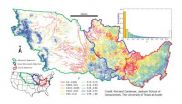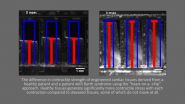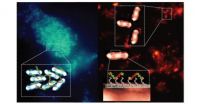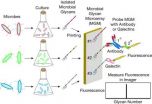(Press-News.org) In the most comprehensive exploration of the association between genetic variation and human metabolism, researchers have provided unprecedented insights into how genetic variants influence complex disease and drug response through metabolic pathways.
The team has linked 145 genetic regions with more than 400 molecules involved in human metabolism in human blood. This atlas of genetic associations with metabolism provides many new opportunities to understand the molecular pathways underlying associations with common, complex diseases.
Metabolic molecules, known as metabolites, include a wide range of different molecules such as vitamins, lipids, carbohydrates and nucleotides. They make up parts of, or are the products of, all biological pathways. This new compendium of associations between genetic regions and metabolite levels provides a powerful tool to identify genes that could be used in drug and diagnostic tests for a wide range of metabolic disorders.
"The sheer wealth of biological information we have uncovered is extraordinary," says Dr Nicole Soranzo, senior author from the Wellcome Trust Sanger Institute. "It's exciting to think that researchers can now take this freely available information forward to better understand the molecular underpinnings of a vast range of metabolic associations."
The team measured the levels of a large number of metabolites, both those already known and many as yet uncharacterised, from many different metabolic pathways.
They found 90 new genetic associations, trebling the figure of known genetic associations with metabolites. In many of the cases where metabolites were known, the team were able to link the molecule to gene function. They mapped genes to their likely substrates or products and linked these to a number of conditions, including hypertension, cardiovascular disease and diabetes.
They further found that these genetic regions map preferentially to genes that are currently targeted in drug-development programmes. This provides new opportunities to assess genetic influences on drug response, and to assess the potential for existing drugs to treat a wide range of diseases.
"We developed an open-access database that allows researchers to easily search through the findings, to understand genetic variants associated with metabolism one metabolite at a time and in the context of the complete metabolic network," says Dr Gabi Kastenmüller, co-senior author from the Helmholtz Center Munich, Germany. "This database will facilitate drug discovery for metabolic disorders and also help researchers to understand the biology behind disease."
Other associations suggest tantalising possibilities for further study. For instance, a number of the genetic associations identified involved aromatic acids, such as tryptophan, which are important for brain function. While this study did not measure association of metabolites in the brain, these genetic findings open new avenues to assess potential genetic influences on brain function and responses to drugs that affect brain function, such as antidepressants.
"This work provides an important new window into the genetic variation underlying human metabolism," said Dr Eric Fauman, study co-author and Associate Research Fellow from Pfizer Inc. "Through targeted Precision Medicine and by linking human disease genes to in vivo biological markers, we hope to enhance our ability to deliver impactful new medicines for patients across a variety of disorders."
INFORMATION:
Notes to Editors
Publication Details
Shin S-Y et al (2014) An atlas of genetic influences on human blood metabolites. Nature Genetics. DOI: 10.1038/ng.2982
Funding
Please see the paper for a full list of funding bodies.
Participating Centres
Please see the paper for a full list of participating centres.
Selected Websites
The Wellcome Trust Sanger Institute is one of the world's leading genome centres. Through its ability to conduct research at scale, it is able to engage in bold and long-term exploratory projects that are designed to influence and empower medical science globally. Institute research findings, generated through its own research programmes and through its leading role in international consortia, are being used to develop new diagnostics and treatments for human disease.
http://www.sanger.ac.uk
The Wellcome Trust is a global charitable foundation dedicated to achieving extraordinary improvements in human and animal health. We support the brightest minds in biomedical research and the medical humanities. Our breadth of support includes public engagement, education and the application of research to improve health. We are independent of both political and commercial interests.
http://www.wellcome.ac.uk
Contact details
Don Powell Media Manager
Wellcome Trust Sanger Institute
Hinxton, Cambridge, CB10 1SA, UK
Tel +44 (0)1223 496 928
Mobile +44 (0)7753 7753 97
Email press.office@sanger.ac.uk
End of Notes to Editors
Atlas shows how genes affect our metabolism
New atlas of molecules paves the way for improved understanding of metabolic diseases
2014-05-11
ELSE PRESS RELEASES FROM THIS DATE:
Flexible supercapacitor raises bar for volumetric energy density
2014-05-11
Scientists have taken a large step toward making a fiber-like energy storage device that can be woven into clothing and power wearable medical monitors, communications equipment or other small electronics.
The device is a supercapacitor—a cousin to the battery. This one packs an interconnected network of graphene and carbon nanotubes so tightly that it stores energy comparable to some thin-film lithium batteries—an area where batteries have traditionally held a large advantage.
The product's developers, engineers and scientists at Nanyang Technological University (NTU) ...
Hydrologists find Mississippi River network's buffering system for nitrates is overwhelmed
2014-05-11
AUSTIN, Texas – A new method of measuring the interaction of surface water and groundwater along the length of the Mississippi River network adds fresh evidence that the network's natural ability to chemically filter out nitrates is being overwhelmed.
The research by hydrogeologists at The University of Texas at Austin, which appears in the May 11 edition of the journal Nature Geoscience, shows for the first time that virtually every drop of water coursing through 311,000 miles (500,000 kilometers) of waterways in the Mississippi River network goes through a natural ...
Patient stem cells used to make 'heart disease-on-a-chip'
2014-05-11
Cambridge, MA—Harvard scientists have merged stem cell and 'organ-on-a-chip' technologies to grow, for the first time, functioning human heart tissue carrying an inherited cardiovascular disease. The research appears to be a big step forward for personalized medicine, as it is working proof that a chunk of tissue containing a patient's specific genetic disorder can be replicated in the laboratory.
The work, published in Nature Medicine, is the result of a collaborative effort bringing together scientists from the Harvard Stem Cell Institute, the Wyss Institute for Biologically ...
Ocean winds keep Antarctica cold, Australia dry
2014-05-11
VIDEO:
Dr. Nerlie Abram, from the Australian National University, explains why ocean winds have stopped Antarctica from warming as much as other continents. Her research also explains droughts in Southern Australia.
Click here for more information.
New Australian National University-led research has explained why Antarctica is not warming as much as other continents, and why southern Australia is recording more droughts.
Researchers have found rising levels of carbon dioxide ...
Hijacking bacteria's natural defences to trap and reveal pathogens
2014-05-11
The breakthrough, published in the journal Nature Materials, could offer an easier way of detecting pathogenic bacteria outside of a clinical setting and could be particularly important for the developing world, where access to more sophisticated laboratory techniques is often limited.
The research was led by Professor Cameron Alexander, Head of the Division of Drug Delivery and Tissue Engineering and EPSRC Leadership Fellow in the University's School of Pharmacy, building on work by PhD student Peter Magennis. Professor Alexander said: "Essentially, we have hijacked ...
UGA research examines fate of methane following the Deepwater Horizon spill
2014-05-11
Athens, Ga. – The 2010 Deepwater Horizon blowout discharged roughly five million gallons of oil and up to 500,000 tons of natural gas into Gulf of Mexico offshore waters over a period of 84 days. In the face of a seemingly insurmountable cleanup effort, many were relieved by reports following the disaster that naturally-occurring microbes had consumed much of the gas and oil.
Now, a team of researchers led by University of Georgia marine scientists have published a paper in the journal Nature Geoscience that questions this conclusion and provides evidence that microbes ...
Galectins direct immunity against bacteria that employ camouflage
2014-05-11
Our bodies produce a family of proteins that recognize and kill bacteria whose carbohydrate coatings resemble those of our own cells too closely, scientists have discovered.
Called galectins, these proteins recognize carbohydrates from a broad range of disease-causing bacteria, and could potentially be deployed as antibiotics to treat certain infections. The results are scheduled for publication in Nature Chemical Biology.
Researchers at Emory University School of Medicine made the discovery with the aid of glass slides coated with an array of over 300 different glycans ...
Study finds patients AFib at higher risk of dementia when meds out of range
2014-05-10
A new study by researchers at the Intermountain Medical Center Heart Institute in Salt Lake City has found that atrial fibrillation patients who are on blood thinning medications are at higher risk of developing dementia if their doses are not in the optimal recommended range.
The study of more than 2,600 AFib patients found they are significantly more likely to develop dementia when using medicines to prevent blood clots, such as warfarin, when their dosing is too high or too low for an extended period of time.
Findings from the study will be presented at the 2014 ...
Bee biodiversity boosts crop yields
2014-05-10
Research from North Carolina State University shows that blueberries produce more seeds and larger berries if they are visited by more diverse bee species, allowing farmers to harvest significantly more pounds of fruit per acre.
"We wanted to understand the functional role of diversity," says Dr. Hannah Burrack, an associate professor of entomology at NC State and co-author of a paper on the research. "And we found that there is a quantifiable benefit of having a lot of different types of bees pollinating a crop."
The researchers looked at blueberries in North Carolina ...
Scientists find gene behind a highly prevalent facial anomaly
2014-05-10
CAMBRIDGE, Mass. (May 9, 2014) – Whitehead Institute scientists have identified a genetic cause of a facial disorder known as hemifacial microsomia (HFM). The researchers find that duplication of the gene OTX2 induces HFM, the second-most common facial anomaly after cleft lip and palate.
HFM affects approximately one in 3,500 births. While some cases appear to run in families, no gene had been found to be causative. That is until Whitehead Fellow Yaniv Erlich and his lab set out to do just that. Their work is described in this week's issue of the journal PLOS ONE.
Patients ...
LAST 30 PRESS RELEASES:
Kidney cancer study finds belzutifan plus pembrolizumab post-surgery helps patients at high risk for relapse stay cancer-free longer
Alkali cation effects in electrochemical carbon dioxide reduction
Test platforms for charging wireless cars now fit on a bench
$3 million NIH grant funds national study of Medicare Advantage’s benefit expansion into social supports
Amplified Sciences achieves CAP accreditation for cutting-edge diagnostic lab
Fred Hutch announces 12 recipients of the annual Harold M. Weintraub Graduate Student Award
Native forest litter helps rebuild soil life in post-mining landscapes
Mountain soils in arid regions may emit more greenhouse gas as climate shifts, new study finds
Pairing biochar with other soil amendments could unlock stronger gains in soil health
Why do we get a skip in our step when we’re happy? Thank dopamine
UC Irvine scientists uncover cellular mechanism behind muscle repair
Platform to map living brain noninvasively takes next big step
Stress-testing the Cascadia Subduction Zone reveals variability that could impact how earthquakes spread
We may be underestimating the true carbon cost of northern wildfires
Blood test predicts which bladder cancer patients may safely skip surgery
Kennesaw State's Vijay Anand honored as National Academy of Inventors Senior Member
Recovery from whaling reveals the role of age in Humpback reproduction
Can the canny tick help prevent disease like MS and cancer?
Newcomer children show lower rates of emergency department use for non‑urgent conditions, study finds
Cognitive and neuropsychiatric function in former American football players
From trash to climate tech: rubber gloves find new life as carbon capturers materials
A step towards needed treatments for hantaviruses in new molecular map
Boys are more motivated, while girls are more compassionate?
Study identifies opposing roles for IL6 and IL6R in long-term mortality
AI accurately spots medical disorder from privacy-conscious hand images
Transient Pauli blocking for broadband ultrafast optical switching
Political polarization can spur CO2 emissions, stymie climate action
Researchers develop new strategy for improving inverted perovskite solar cells
Yes! The role of YAP and CTGF as potential therapeutic targets for preventing severe liver disease
Pancreatic cancer may begin hiding from the immune system earlier than we thought
[Press-News.org] Atlas shows how genes affect our metabolismNew atlas of molecules paves the way for improved understanding of metabolic diseases






